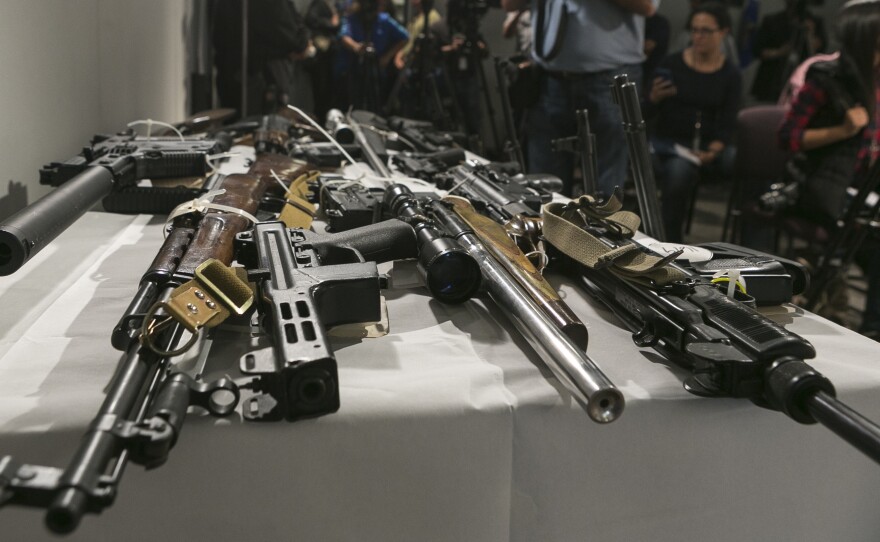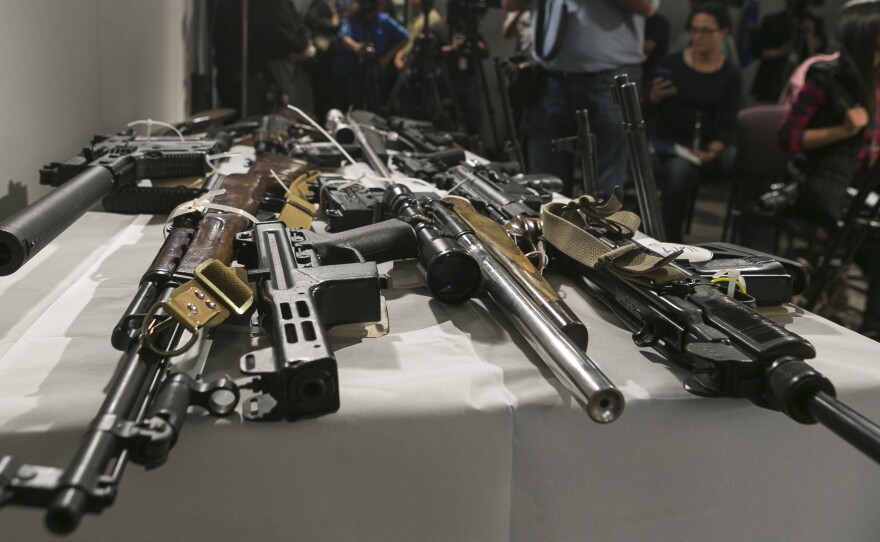
In California, officials are ramping up a unique program that identifies and seizes guns from people who are prohibited from keeping them. Under state law, a legally registered gun owner loses the right to own a firearm when they are convicted of a crime or become mentally ill.
Last year, state agents seized nearly 2,000 firearms, but implementing the gun seizure program is a painstaking job. In a recent operation, a caravan of four unmarked trucks traversed the bedroom communities of San Francisco's East Bay. The trucks carry nine state agents wearing bullet proof vests and armed with .40-caliber Glock pistols and Tasers. They'll spend the next six hours looking for illegal guns, explains Special Agent Kisu Yo of the California Department of Justice.
An Extensive, Constantly Updated Database
Yo's team will visit the homes of 11 people who are considered Armed and Prohibited Persons, people on the so-called APPs list. They are all people who at one time purchased firearms legally, but have since run afoul of the law, Yo says. "Such as maybe a felony conviction, mental health commitment, they received a restraining order, domestic violence restraining order -- some type of a misdemeanor conviction that prohibits them from possessing firearms."
Beginning In 2007, California officials began collecting names from court records, medical facilities and lists of known or wanted criminals, then cross-referenced them against the federal instant criminal background check system for gun-buyers. The list is updated every day.
California is the only state in the country that identifies people who are prohibited from having a gun and then sends agents out to knock on their door.
This is tedious, expensive and time-consuming work, requiring hours of background checks and cross-referencing even before the agents hit the streets.
"There's a lot of work that goes into these," says Michelle Gregory, spokeswoman for the California Department of Justice. "People aren't always home, there's different stories as to where the firearms may be and there's a lot of follow-up needs to happen after. So there's still going to be a lot of work even after they come out to these homes trying to confiscate these weapons."
On this night, Yo's agents didn't find the man they were looking for at the house of one convicted felon in the suburb of San Leandro. Still, since he's on probation, the agents had the right to search his house.
"This guy is a convicted felon," Yo says. "He had, or has, two guns in his name. We found one of the guns listed in his name, a revolver."
Since they can't find the second gun, two agents are dispatched to the felon's workplace to question him.
An Expanding Program
The NRA initially supported California's program, but it's since become disenchanted. The program "is being billed as something that it's not," says C.D. "Chuck" Michel, a civil rights attorney whose clients include the NRA and the California Rifle and Pistol Association Foundation.
"It's being billed as going after dangerous people," Michel says.
"And for the most part, with some exceptions, admittedly, it's not going after dangerous people. It's not making society any safer."
Michel's main problem is that state doesn't tell people they're prohibited from owning a firearm, he says. "For example, you can get in a fight, and plead guilty to being in a fight and wind up having a statutory prohibition on possessing firearms get triggered for a 10-year period. But the courts haven't told them that."
Despite that criticism, the APPS program is expanding. Until recently, California had just 33 agents to track down nearly 20,000 people on the APPs list. But thanks to a bill signed into law this spring by Gov. Jerry Brown, the state is spending $24 million to hire an additional 36 agents.
Back on the street, the state agents are regrouping in a shopping mall parking lot. On a good night, they say they might seize 30 guns. But this time they've confiscated only eight firearms, including an assault weapon, and taken two men with outstanding warrants into custody.
Still, agent Kisu Yo appears satisfied. "Overall, it was a very successful night. No one got hurt and we did definitely got some guns off the street tonight," he says. "You know, if you get one gun off the street, it's a win."
Thus far, no other state has adopted California's gun seizure law. However, there is a bill in Congress to provide funds for other states to follow this model.
Copyright 2013 NPR. To see more, visit www.npr.org.






